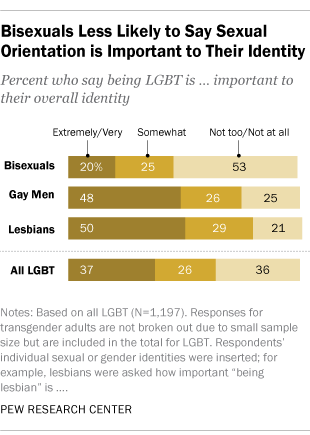Why Bisexuals Rarely Come Out

By:
When I was in high school, a classmate claimed bisexuality was not a real thing. "You swing one way or the other, unless you're just greedy and indecisive." I knew this was a thoughtless, oversimplified way to characterize human sexuality, but I didn't realize how common, and harmful the anti-bisexual narrative actually was.
Following Oregon's recent election of Kate Brown, the country's first openly bisexual governor, the Pew Research Center highlighted the growing visibility of openly bisexual public figures outside the entertainment industry. There are plenty of websites that aim to keep us posted on which A-listers are bisexual, but what about politicians who could really make a legislative difference for this community of people? In 2013, Congresswoman Kyrsten Sinema became the first openly bisexual member of Congress. Considering the fact that she serves in Arizona, which isn't exactly known for left-leaning or progressive social politics, it means a lot that she chose to share something so personal and courageous with the public.
These two aren't the only politicians to come out as bisexual, but it's not commonly seen either. "It’s harder for people to wrap their minds around that," Wisconsin Democratic State Rep. JoCasta Zamarripa, who is openly bisexual, told the Milwaukee Journal Sentiment in 2012. Seriously. It's hard enough getting everyone to accept same-sex couples, let alone people attracted to men and women. Imagine all the invasive questions surrounding that.
So how significant is sexuality to bisexual identity?
The extra layer of complexity that State Rep. Zamarripa referred to might explain why bisexuals have a vastly different experience with sexuality than their gay and lesbian counterparts. Only 20 percent of bisexuals reported that sexuality was an extremely important part of their identity, according to research from a 2013 Pew survey. In an extensive New York Times Magazine article published last year, writer Benoit Denizet-Lewis argued this lack of strong identity among bisexuals "feeds into a belief among some gays and lesbians that bisexuals are essentially fence-sitters who can pass for straight for decades at a time and aren’t especially invested in the L.G.B.T. community."
Robyn Ochs, a bisexual activist and speaker, divulged to Denizet-Lewis that she was aware of her bisexuality in college but chose not to come out due to fear of judgment from lesbians. "They said that bisexuals couldn’t be trusted, that they would inevitably leave you for a man... [F]or me to say I was a lesbian would have required that I dismiss all of my previous attractions to men as some sort of false consciousness. So I didn’t come out."
In response to the Times Magazine write-up, Mark Joseph Stern claimed the modern bisexual movement has "failed to articulate a coherent platform beyond its initial goals of recognition. If bi activists continue to define bisexuality as nothing more than a more imaginative set of erotic and romantic urges, they’ll further forestall the development of a mature bi culture—giving us no more than the completely sex-oriented definition we started out with."

Bisexuals are less likely to share their sexuality with loved ones than gays and lesbians. Though bisexuals reported fewer instances of discrimination than gay men and lesbians, the stigma of bisexuality remains a painful reality for many, and that, coupled with fears of judgment from gays or lesbians, could further explain why it takes a lot for bisexuals to come out. There's also the issue of bisexual double standards. Bisexual women seem to be accepted more than bisexual men. Bisexuals are more likely to be married than their gay and lesbian counterparts, but less than 10 percent of them report having a same-sex partner for life.
As the election nears and presidential hopefuls begin to open up about their platforms and ideas, this underserved group deserves a closer look and more attention, especially since there are likely more bisexual leaders who just haven't felt ready or welcome enough to come out yet.
